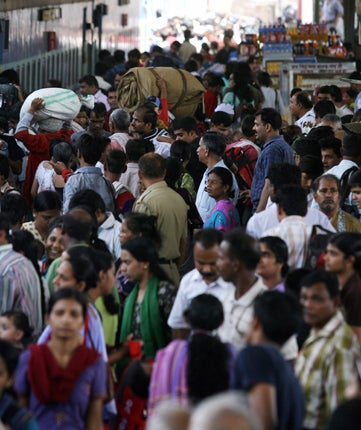ID cards planned for India's 1.1 billion
Hi-tech entrepreneur will lead operation to create huge database

Your support helps us to tell the story
From reproductive rights to climate change to Big Tech, The Independent is on the ground when the story is developing. Whether it's investigating the financials of Elon Musk's pro-Trump PAC or producing our latest documentary, 'The A Word', which shines a light on the American women fighting for reproductive rights, we know how important it is to parse out the facts from the messaging.
At such a critical moment in US history, we need reporters on the ground. Your donation allows us to keep sending journalists to speak to both sides of the story.
The Independent is trusted by Americans across the entire political spectrum. And unlike many other quality news outlets, we choose not to lock Americans out of our reporting and analysis with paywalls. We believe quality journalism should be available to everyone, paid for by those who can afford it.
Your support makes all the difference.India is to embark on an ambitious plan to provide each of its 1.1 billion-plus citizens with a national identity card and has picked an industrialist who helped to spearhead the country's IT revolution to lead the project.
Nandan Nilekani, the entrepreneur who helped the best-selling author Thomas Friedman to coin the phrase and book title "The world is flat", was asked by the government to help to create what would be the largest citizens' database in a democracy. Only China has a larger scheme.
The government believes that the scheme, to be finalised over three years, will help in the delivery of vital social services to the poorest in society who often lack – or are at least told they lack – sufficient identification papers. The government has long complained that most of the money set aside for the neediest is diverted as a result of corruption, and it believes the cards could help to tackle identity theft and fraud.
At a time of increased concern over the threat of militant violence, the government also hopes that the creation of the scheme will boost national security and help police and law and order officials. The creation of the ID or Unique Identification Number (UID) was a major plank of the manifesto of the ruling Congress Party during the recent election.
Yet the scheme is not without controversy. Some observers have questioned how the cards will actually improve the delivery of services, even if the identity of recipients can be proved. Some have also expressed concerns that the scheme could be divisive.
"It cannot be denied that the system of proving identity in India is complicated and confusing. But a system of national ID cards can technically introduce a new route to citizenship," said Charu Lata Hogg, an associate fellow of the Asia programme at Chatham House. "This could be used as a security measure by the government which leaves migrant workers, refugees and other stateless people in India in limbo, without access to public services, employment and basic welfare."
The recruitment of Mr Nilekani, 54, a founder of the Bangalore-based Infosys Technologies, is a coup for the government of Manmohan Singh, who contacted him earlier in the month with an invitation to join a planning commission. The premier said he was keen to recruit and utilise talents outside the government to help with the country's development – a novel move in India. Though he turned down that offer, he was inspired to take up a public role.
Mr Nilekani will stand down from his position as co-chairman of Infosys to avoid a conflict of interest, and will serve on a specially formed commission – the Unique Identification Authority of India – with the rank equivalent to a cabinet minister.
It was Mr Nilekani who inspired Thomas Friedman's treatise on globalisation, The World Is Flat (2005). Mr Friedman recalled: "I was in India interviewing Nandan Nilekani at Infosys. And he said to me, 'Tom, the playing field is being levelled' ... and it hit me: Holy mackerel, the world is becoming flat."
Join our commenting forum
Join thought-provoking conversations, follow other Independent readers and see their replies
Comments